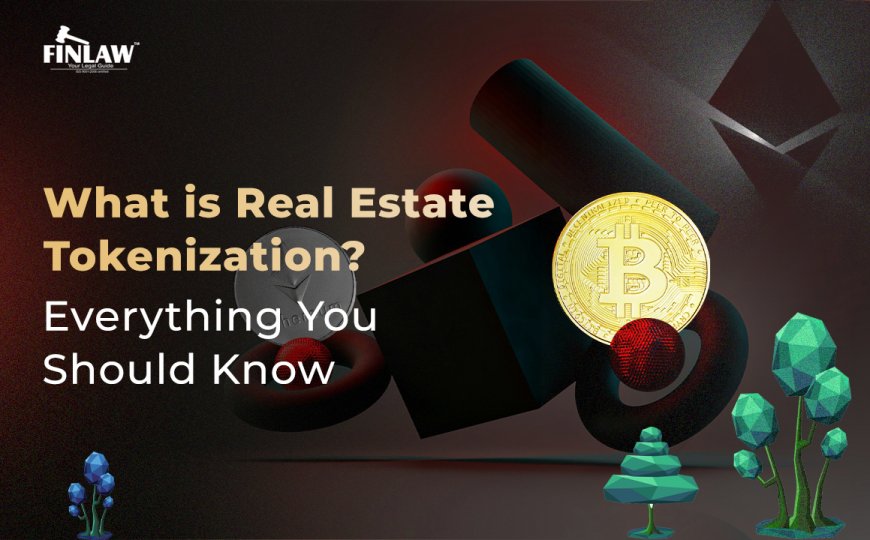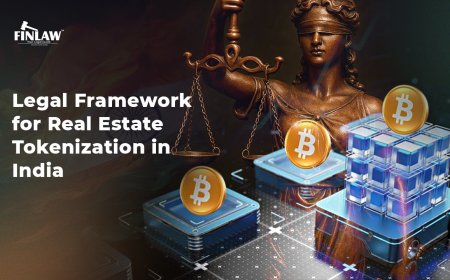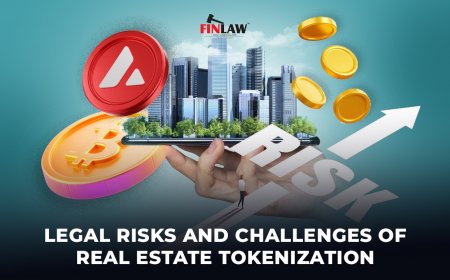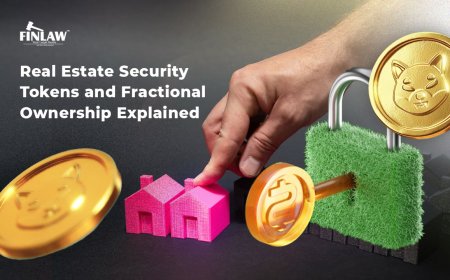What is Real Estate Tokenization? Everything You Should Know
Discover what real estate tokenization is, how it works, its benefits, risks, and the future of property investment in India.

Real estate has long been viewed as a safe and profitable investment in India, but challenges like high entry costs, poor liquidity, and complex transfer procedures make it difficult for small investors to participate. Enter real estate tokenization — a concept that combines property with blockchain to enable fractional ownership, faster transactions, and global investment opportunities.
If you are wondering what is real estate tokenization and how it might reshape India’s property market, this comprehensive guide has all the answers.
What is Real Estate Tokenization?
Real estate tokenization is the process of converting ownership rights in a property into digital tokens on a blockchain network. Each token represents a fraction of the property’s value, enabling investors to buy, sell, or trade real estate like shares in a company.
For example, a property worth ₹50 crore could be split into 50 lakh tokens worth ₹100 each. This means even a retail investor can invest in prime properties without needing huge capital.
In short: tokenization turns real estate into a digital asset, bringing transparency, security, and accessibility to property investments.
How Real Estate Tokenization Works
-
Property Selection – A commercial or residential property is chosen for tokenization.
-
Legal Structuring – Ownership is transferred into a Special Purpose Vehicle (SPV) or trust, which issues tokens.
-
Token Creation – Smart contracts on blockchain generate tokens representing ownership rights or cashflows.
-
Distribution – Tokens are sold to investors through digital platforms.
-
Trading & Income – Investors can trade tokens on secondary markets and receive rental income or profits automatically via blockchain.
Benefits of Real Estate Tokenization
1. Fractional Ownership
Investors can own a small portion of high-value real estate, making property investment affordable and inclusive.
2. Liquidity in Real Estate
Unlike traditional property investments that lock in capital for years, tokenized assets can be traded easily, providing quicker exits.
3. Transparency and Security
Blockchain records every transaction, reducing the risk of fraud and disputes over ownership.
4. Faster Settlements
Smart contracts automate processes like ownership transfer and rent distribution, cutting out delays and middlemen.
5. Global Investment Opportunities
Tokenization makes it easier for Indian developers to attract foreign investors, provided they comply with FEMA and SEBI regulations.
Challenges of Real Estate Tokenization in India
While tokenization looks promising, it faces several hurdles in the Indian context:
-
Regulatory Grey Area – India does not have a dedicated law for tokenized assets. Depending on structure, tokens may be classified under SEBI securities laws, FEMA, or state property regulations.
-
Land Record Issues – Property title verification is a major bottleneck as land records are not fully digitized in many Indian states.
-
Liquidity Risks – Secondary markets for tokenized real estate are still underdeveloped in India.
-
Taxation – GST, capital gains tax, and stamp duty may still apply to tokenized property investments.
-
Platform Reliability – The safety of investments depends heavily on the tokenization platform, custodians, and property managers.
Real Estate Tokenization in India: Current Landscape
At present, India lacks a specific regulatory framework for real estate tokenization. However:
-
SEBI regulates securities and could classify certain real estate tokens as security tokens.
-
RBI & FEMA rules govern foreign participation in Indian property investments.
-
State property laws apply for land titles, registration, and stamp duties.
-
REITs in India already allow fractional property investment — tokenization could be the next step in evolution.
Legal experts suggest that India may eventually introduce tokenized REITs or regulated real estate security tokens once land digitization and blockchain adoption progress further.
Global Examples India Can Learn From
Countries like Switzerland, the UAE, and the US have already launched large-scale tokenized real estate projects:
-
Dubai: Developers like DAMAC are tokenizing luxury real estate to attract global investors.
-
Europe: Tokenized REITs allow investors to buy blockchain-based shares of multiple properties.
-
US: Rental properties are tokenized, with monthly rental income distributed automatically to investors.
These examples show that India, with its booming property sector, could become a major hub for tokenized investments once regulations mature.
Key Use Cases of Real Estate Tokenization
-
Commercial Real Estate – Office towers and malls with steady rental income.
-
Vacation Homes – Shared fractional ownership in luxury resorts and holiday homes.
-
Rental Portfolios – Tokenized residential or commercial rentals with automated income distribution.
-
REIT-like Tokenized Funds – Pooling multiple assets into a tokenized investment vehicle.
Investor Checklist Before Buying Tokenized Real Estate
-
Ensure the property has clear title and verified documentation.
-
Check whether tokens are legally linked to ownership rights.
-
Review the platform’s reputation, escrow arrangements, and custodial services.
-
Understand tax obligations including capital gains and GST.
-
Confirm whether tokens are tradeable on secondary markets.
The Future of Real Estate Tokenization in India
-
Blockchain in Land Records – Many states like Maharashtra and Karnataka are digitizing property records, paving the way for tokenization.
-
Regulatory Framework – SEBI and RBI may issue guidelines for tokenized securities and cross-border flows.
-
Integration with Fintech Platforms – In the future, Indian investors may buy tokenized real estate alongside stocks and bonds on the same app.
-
Global Capital Inflows – Tokenization could attract foreign investors seeking exposure to India’s fast-growing real estate sector.
FAQs
Q1: What is real estate tokenization in simple words?
It is the process of converting property ownership into digital tokens on blockchain, allowing multiple investors to own small fractions of the same property.
Q2: Is real estate tokenization legal in India?
There is no specific law yet. Tokens may fall under SEBI, FEMA, and state property laws, so expert legal guidance is essential.
Q3: Can I sell tokenized real estate easily?
Liquidity depends on the platform. While tokenization enables trading, secondary markets in India are still evolving.
Q4: How is tokenized real estate taxed?
Capital gains tax, GST, and stamp duty may apply — just like traditional real estate. Investors should seek tax advice.
Q5: How is tokenization different from REITs?
Both allow fractional real estate ownership, but tokenization uses blockchain, making transactions faster, transparent, and potentially global.
Conclusion
Real estate tokenization is a powerful innovation that could revolutionize property investment in India. It makes real estate more accessible, transparent, and liquid. However, without clear regulations, it remains in a nascent stage in India.
For now, investors and developers should proceed with caution, ensure compliance, and focus on well-structured, legally sound projects. With digitization of land records and regulatory clarity, tokenization could soon become as mainstream as REITs in India.
Final takeaway: Real estate tokenization is the future of property investment, but in India, success depends on regulatory reforms and adoption of blockchain in land and property records.
What's Your Reaction?



















